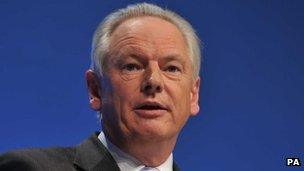Government efficiency drive on track but still a 'long way to go'
- Published
- comments

The government has a duty to cut its running costs, Mr Maude says
Efforts to cut the cost of running government are on track but have a "long way to go", ministers have said.
Cabinet Office Minister Francis Maude said the efficiency drive had been focused so far on "low-hanging fruit" but would move "further up the tree".
The largest single saving over the past year - £1.5bn - came from a fall in civil servant numbers and controls on non-essential Whitehall recruitment.
Spending on consultants, marketing, property and procurement also fell.
Labour has said cuts are hitting core services, but Mr Maude told the BBC eliminating unnecessary spending and using resources more efficiently would actually help protect front-line budgets.
The government say they managed £5.5bn in departmental efficiency savings between March 2011 and March 2012 and these have been independently audited.
Of these, £1bn was saved by using fewer consultants, £390m on limiting marketing budgets, £200m by rationalising the government's property portfolio and £500m from more efficient buying of goods and services across different departments.
'First duty'
The cuts come on top of £3.75bn saved between May 2010 and March 2011.
Mr Maude said the government, like any business, had to increase its productivity and given the scale of the deficit it had inherited, it was the coalition's "first duty" to cut its own costs.
The "rising expectations" of the public could still be met while spending money more wisely, he said.
"In many cases, they enable us to improve the service better," he said.
"Where we make a service available online, it is in many cases more convenient for the service user as well as being much, much cheaper.
"We can get services which are as good or better than they are now but for much less cost."
He defended the reduction in civil-service headcount, saying it had "grown unnecessarily" under Labour and, in many cases, things could be done better with fewer staff.
"We are cutting the size of the civil service considerably. It is already the smallest since World War II and there is more to go."
'Perfect state'
Many civil servants were "adapting well" and finding new ways of working, but Mr Maude added that conditions were "challenging" and many officials were "out of the comfort zone".
Unions are currently at odds with ministers over plans for long-term reform of the civil service.
These could see the worst performing 10% of staff face being fired after a year if they fail to improve, new delivery methods for services, and ministers given the power to choose who runs departments.
The civil servant who has been leading the government's efficiency drive since the coalition came to power, Ian Watmore, left his post suddenly earlier this summer.
But Mr Maude said the savings programme had a "long way to go" since no organisation, including government, was ever in a "perfect state" of efficiency.
"We need to go further. We have harvested mainly low-hanging fruit so far. We need to go further up the tree.
"That means getting some ladders and doing things a bit differently in future."
For Labour, Jon Trickett, shadow Cabinet Office minister, said: "Far from protecting the front line, they are cutting thousands of police officers and have broken their promise to protect the NHS budget which has fallen two years in a row.
"Already, 4,500 nurses have been cut since David Cameron became Prime Minister. And yet at the same time the salary bill for Tory and Lib Dem spin doctors has risen by 25% in just one year - so much for cutting the cost of Government."
Campaign group The Taxpayers Alliance said some departments were doing better than others.
"When the Department for Energy and Climate Change increases its headcount, for example - as it has done every quarter over the past year - that only serves to undo the good work being done elsewhere to clean away unnecessary fat in the arteries of government," it said.
- Published19 June 2012
- Published12 June 2012
- Published16 May 2012